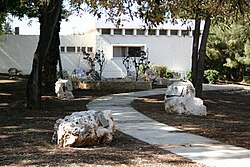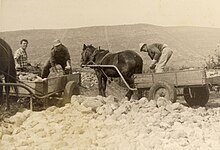Betzet
Betzet
| |
|---|---|
 | |
| Coordinates: 33°4′14.52″N 35°8′9.23″E / 33.0707000°N 35.1358972°E | |
| Country | Israel |
| District | Northern |
| Council | Mateh Asher |
| Affiliation | Moshavim Movement |
| Founded | 1951 |
| Founded by | Yugoslavian and Romanian Jews |
| Population (2022)[1] | 449 |
Betzet (Template:Lang-he-n) is a moshav in the Western Galilee in northern Israel. Located near Shlomi and Nahariya, it falls under the jurisdiction of Mateh Asher Regional Council. In 2022 its population was 449.[1]
History
The modern-day Moshav Betzet was founded in 1951 by on land belonging to the Palestinian village al-Bassa, which was depopulated in the 1948 Arab–Israeli War.[2] The ancient town is renowned in historical records as being one of several places along the route to Tyre where produce transported from the Land of Israel was often sold in the local marketplaces, mentioned as such in the Tosefta (Shevi'it 4:8-ff.) and in the 3rd century Mosaic of Rehob.[3] The new founders were immigrants to Israel from the Balkan states, especially Yugoslavia and Romania. The community retains the name of the ancient village of Betzet which is estimated to have existed nearby. On 12 August 1968, two Syrian MiG-17F aircraft landed in error at Betzet.

The area is about 2,200 dunams. Most of the residents work in growing bananas, avocadoes and turkeys.
Landmarks
Tel Betzet (Tel means "hill" or "archaeological site") is located south of the village. It has pottery vessels from the Copper Age and the middle Canaanite period. Likewise wine-pressing holes and graves from the Roman and Byzantine imperial eras are preserved.
Betzet Aerodrome, a disused World War II British aerodrome to the west of Betzet. A helipad has been built on the north-western part of the runway by the Israeli Air Force. There are numerous derelict structures from the British era on site; they include AA gun mounts, underground aircraft pens and hangars. The aerodrome grounds are used today as agricultural land and contain banana, olive and pomegranate groves. The Israeli Air Force uses the helipad occasionally and the local radio control flying model club has its activity on the helipad on weekends.
References
- ^ a b "Regional Statistics". Israel Central Bureau of Statistics. Retrieved 21 March 2024.
- ^ Khalidi, Walid (1992). All That Remains: The Palestinian Villages Occupied and Depopulated by Israel in 1948. Washington D.C.: Institute for Palestine Studies. pp. 8–9. ISBN 0-88728-224-5. ISBN 0-88728-224-5.
- ^ Michael Avi-Yonah, Gazetteer of Roman Palestine, Jerusalem 1976, p. 42.
External links
- Betzet Authority for Development of the Galilee Template:He icon

